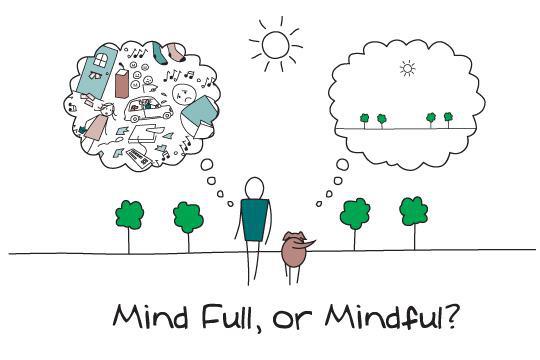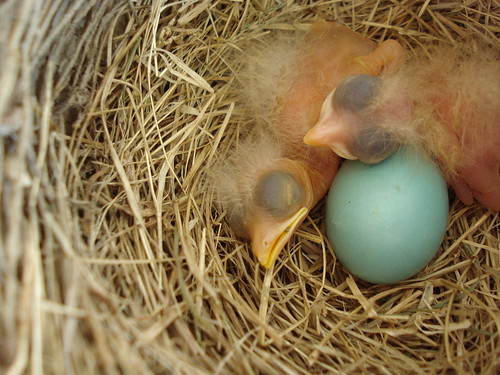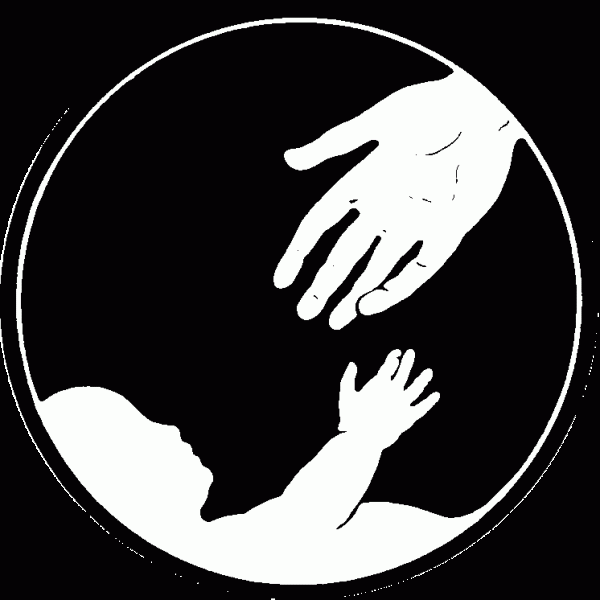
This was a good reminder for me. It’s hard to be present and responsive and enjoy what’s right in front of us if our mind is full of thoughts and worries about other things. I wish I knew who to credit for this drawing, but I don’t. I found it on facebook, and tried to trace it to its origins, and while it appears in many places on the web, it’s always without attribution.
If I could draw even simple stick figures, I’d replicate it, but I’d depict an adult and a child walking together. I think small children are naturals when it comes to being fully present and engaged in the moment. This picture also reminds me of the importance and healing quality of spending time in nature, which can help to quiet our minds. I had the opportunity to experiment with quieting my mind and awakening my senses to all that was around me just two weeks ago during a hiking trip into the wilds of Big Sur. Each morning before beginning our hike, our leader would help to set a tone and focus our attention by reading a selected poem, and inviting us to join in a simple ritual of “bowing in”, after which we’d spend the first leg of our hike walking in silence.
When I studied with Magda Gerber, she often talked about the importance of the quality of attention adults brought to interactions with children. She stressed the necessity of slowing down, and really focusing, and bringing our full attention to the child.
In her post Magda Gerber’s Gift To Grown Ups, Janet Lansbury writes about two kinds of quality time we can spend with babies and toddlers:
“One of the gifts that I am most grateful for is Magda Gerber’s description of two types of ‘quality time.’ The first kind: “wants something” quality time is when we have a task to do with a baby like diapering, feeding, bathing, or clipping his toenails, and we challenge ourselves to slow down, ignoring our instinct to zip through it as quickly as possible. We try to focus on the experience, talking the baby through each step, asking for cooperation, sometimes dealing with resistance. It suddenly occurs to us, “What’s the rush? Is there anything more important than this time together right now? Why are these moments with a child any less important than his ‘play time’?” The child looks into our eyes as if to ask us what will happen next, and we realize that we are indeed having an intimate moment together.
The second kind of quality time, “wants nothing,” can encompass a wide range of experiences, but all we are asked to do is pay attention and have no agenda of our own. It can mean being quietly available as a baby explores patterns of light on a blanket beneath him, or standing nearby while he has a screaming meltdown because he cannot have another cookie. It may be trickier to see the benefit for parents and caregivers in this latter scenario, but it is clarity. When we pay full attention to our child for intervals each day, no matter what the tone of our exchange or the outcome is, we are giving him the quality time he needs. We are doing our job.”
Magda taught an exercise that I find helpful to this day in achieving this quiet, present state of mind. She suggested that before entering a parent/infant class, or before beginning a care giving task with babies, adults should take a moment to consciously slow down, and empty the contents of their minds into a basket (real or imaginary). Imagine depositing all of your worries, your lists of things that need to be done, your thoughts about what to make for dinner, into that basket, and saying to yourself, “I am leaving you here now, but I promise I’ll be back to pick you up soon.” It’s such a simple thing to do, but for me, has been very powerful.
Do you have a favorite way to bring yourself more fully into the present moment? Do you notice a difference in the way your baby or toddler responds when you are able to be more slow and focused in your interactions?




